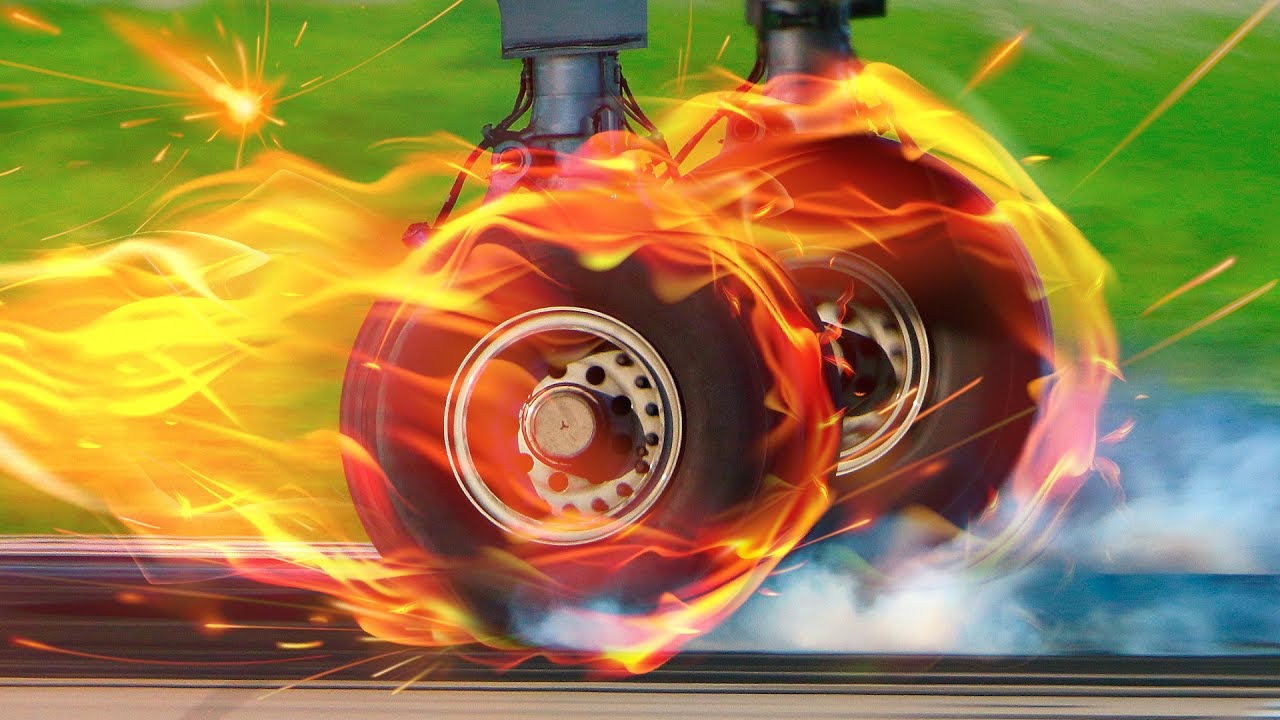How Such Small Tires Can Land a Huge Plane
Airplanes are mysterious things: unimaginably heavy metal giants soaring through the sky, jam-packed not only with people but also all kinds of electronic gizmos. But look at the airplane’s tires compared to the plane’s body – they’re tiny! How can they withstand all that weight and speed?
Let’s check out what’s happening when a plane is preparing to land on the runway. All 300 tons of your airplane touch the ground while still going 170 mph. Imagine your typical 2-story house, fully furnished, dropping to the ground as fast as a flying arrow – that must be quite the impact! And still, those tiny little tires don’t pop under the tremendous pressure?
Other videos you might like:
Why No One Should Swap Seats on a Plane https://www.youtube.com/watch?v=tLvlmtSPGx4&
Pilots Reveal 16 Nuances That Make Your Flight Safe https://www.youtube.com/watch?v=XVYXErxau-U&
What Happens When a Bird Flies Into a Plane Engine https://www.youtube.com/watch?v=CozYL-_ttEc&
TIMESTAMPS:
Why pilots point the aircraft nose toward the sky before landing 1:17
What’s inside airplane tires? 2:21
And what makes them so strong? 3:54
What happens when one of the tires fails 4:20
Why plane tires are so tiny and skinny 5:34
Hydroplaning 7:20
#planes #aviation #brightside
SUMMARY:
– Pilots must point the aircraft nose toward the sky just before landing so that they don’t stall the machine.
– To make an airplane tire, producers use a mix of different kinds of synthetic rubber. It makes aircraft tires so strong that each of them can easily deal with a 38-ton load.
– The gas that fills aircraft tires is nitrogen. It doesn’t react with rubber, which makes it a much safer choice for airplanes.
– The pressure in plane tires is 6 times bigger than the pressure in your car tires. It’s 200 psi, and that’s what you’d feel if you took a dive 450 ft underwater.
– There can be plenty of wheels on large airplanes, like an Airbus A380 or Boeing 747. And if one of the tires fails, the plane will still land safely.
– When a plane touches the ground, its tires aren’t rolling at first – they’re just skidding. In other words, the plane is dragging them along the runway until it slows down enough for the wheels to be able to rotate.
– Larger tires would be pointless since they wouldn’t make landing more effective or safer.
– After plane tires are produced, they always get tested. Manufacturers create computer simulations that check how tires will behave if they’re pushed past their speed limit or get overloaded.
– And still, airplane tires aren’t entirely safe from bursting. Accidents did happen in the past, and planes did skid off runways because of one of the tires exploding mid-landing.
– Hydroplaning is a situation that occurs when the runway is covered with a layer of water preventing a landing plane from braking and stopping in time.
– The aircraft just keeps skidding forward, unable to find traction.
– That’s why some airports have grooves on the runway. Water flows into these grooves, making the surface not so slippery and dropping the chances of hydroplaning.
Music by Epidemic Sound https://www.epidemicsound.com/
Subscribe to Bright Side : https://goo.gl/rQTJZz
—————————————————————————————-
Our Social Media:
Facebook: https://www.facebook.com/brightside/
Instagram: https://www.instagram.com/brightgram/
5-Minute Crafts Youtube: https://www.goo.gl/8JVmuC
Stock materials (photos, footages and other):
https://www.depositphotos.com
https://www.shutterstock.com
https://www.eastnews.ru
—————————————————————————————-
For more videos and articles visit:
http://www.brightside.me/



![[ID: veB31XmUQm8] Youtube Automatic](https://okumasaati.net/wp-content/uploads/2020/10/id-veb31xmuqm8-youtube-automatic-360x203.jpg)
![[ID: Qx0MRvCq5zI] Youtube Automatic](https://okumasaati.net/wp-content/uploads/2020/10/id-qx0mrvcq5zi-youtube-automatic-360x203.jpg)
![[ID: g5sXawX5oLw] Youtube Automatic](https://okumasaati.net/wp-content/uploads/2020/10/id-g5sxawx5olw-youtube-automatic-360x203.jpg)
![[ID: FmPmPP4Jlcw] Youtube Automatic](https://okumasaati.net/wp-content/uploads/2020/10/id-fmpmpp4jlcw-youtube-automatic-360x203.jpg)
![[ID: xEodej_M7TI] Youtube Automatic](https://okumasaati.net/wp-content/uploads/2021/05/id-xeodejm7ti-youtube-automatic-360x203.jpg)
![[ID: hRAFPdDppzs] Youtube Automatic](https://okumasaati.net/wp-content/uploads/2020/10/id-hrafpddppzs-youtube-automatic-360x203.jpg)